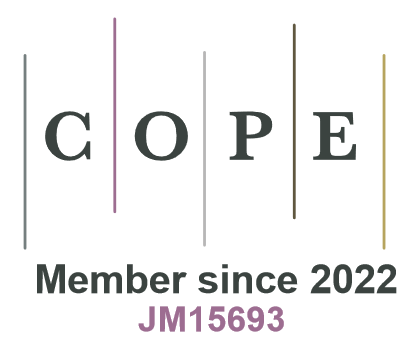Linear Morphometric Analysis of Auricular Measurements of a Nigerian Igbo population
DOI:
https://doi.org/10.18778/1898-6773.86.3.03Keywords:
Auricle, morphometrics, ergonomic guide, forensic identification, IgboAbstract
The human ear (auricle) is an important body component in biometric studies and forensic identification. The purpose of this study was to evaluate linear auricular morphometric measurements of a Nigerian Igbo population.
300 participants (142 males to 158 females) of at least 16 years of age were randomly recruited from settlements in the South-Eastern states of Nigeria. The participants were made to sit in a Frankfort horizontal position and auricular measurements such as total ear height (TEH), ear width (EW), lobule height (LH) and lobule width (LW) were obtained using a digital vernier caliper (validated by calibrating to 0.01mm). The ear index (EI) and lobule index (LI) were calculated using the measurements. Data obtained were analyzed using the Statistical Package for the Social Sciences (SPSS version 23.0).
The following mean values were recorded for males: TEH [Right (R) = 47.01±6.30, Left (L) = 46.24±5.85], EW (R = 25.06±4.14, L = 24.68±4.32), LH (R = 13.92±2.61, L = 13.99±2.18), LW (R = 12.99±2.30, L = 13.30±1.94), EI (R = 53.47±7.23, L = 53.28±6.69) and LI (R = 95.17±18.12, L = 96.80±18.56); for females, TEH (R = 48.25±6.83, L = 48.25±6.24), EW (R = 25.19±3.93, L = 24.57±4.21), LH (R = 14.44±2.67, L = 14.89±2.55), LW (R = 13.37±2.26, L = 13.78±2.04), EI (R = 52.50±6.85, L = 50.93±7.05) and LI (R = 94.60±19.59, L = 94.30±16.63). Gender differences were highly significant regarding total ear height, lobular length and width, as well as the ear index of the left auricle.
This study provides a baseline data for auricular morphometrics of adult Nigerian Igbos and could be used as an ergonomic guide towards the creation of hearing aids in the future and to solve possible forensic issues associated with identification of remains.
Downloads
References
Ahmed AA, Omer N. 2015. Estimation of sex from the anthropometric ear measurements of a Sudanese population. Leg Med (Tokyo) 17:313–319. https://doi.org/10.1016/j.legalmed.2015.03.002
View in Google Scholar
Alexander KS, Stott DJ, Sivakumar B, Kang N. 2011. A morphometric study of the human ear. J Plast Reconstr Aesthet Surg 64:41–47. https://doi.org/10.1016/j.bjps.2010.04.005
View in Google Scholar
Barut C, Aktunc E. 2006. Anthropometric measurements of the external ear in a group of Turkish primary school students. Aesthetic Plast Surg 30:255e9. https://doi.org/10.1007/s00266-005-0182-1
View in Google Scholar
Brucker MJ, Patel J, Sullivan PK. 2003. A morphometric study of the external ear: age- and sex-related differences. Plast Reconstr Surg 112:647e52. https://doi.org/10.1097/01.PRS.0000070979.20679.1F
View in Google Scholar
Deopa D, Thakkar HK, Prakash C, Niranjan R, Barua MP. 2013. Anthropometric measurements of external ear of medical students in Uttarakhand Region. J Anat Soc India 62:79–83. https://doi.org/10.1016/S0003-2778(13)80018-4
View in Google Scholar
Eboh DEO. 2013. Morphological changes of the human pinna in relation to age and gender of Urhobo people in Southern Nigeria. Journal of Experimental and Clinical Anatomy 12:68. https://doi.org/10.4103/1596-2393.127964
View in Google Scholar
Ekanem AU, Garba SH, Musa TS, Dare ND. 2010. Anthropometric study of the pinna (auricle) among adult Nigerians resident in Maiduguri metropolis. J Med Sci 10:176–80. https://doi.org/10.3923/jms.2010.176.180
View in Google Scholar
Elyasi L, Araban S, Eftekhar Vaghefi SH. 2020. Auricle Morphometry in Iranian Population. Anatomical Sciences. 17(2):47–54.
View in Google Scholar
Faakuu E, Abaidoo CS, Appiah AK, Tetteh J. 2020. Morphological study of the external ear among the Daggabas in the upper west region of Ghana. Scientific African 8:e00408. https://doi.org/10.1016/j.sci-af.2020.e00408
View in Google Scholar
Jung SH, Jung SH. 2003. Surveying the dimensions and characteristics of Korean ears for the ergonomic design of ear-related products. Int J Ind Organ 31:361–73. https://doi.org/10.1016/S0169-8141(02)00237-8
View in Google Scholar
Kumar BS, Selvi GP. 2016. Morphometry of ear pinna in sex determination. Int J Anat Res 4(2):2480–2484. https://doi.org/10.16965/ijar.2016.244
View in Google Scholar
Meijerman L, van der Lugt C, Maat GJ. 2007. Cross-sectional anthropometric study of the external ear. J Forensic Sci 52:286–93. https://doi.org/10.1111/j.1556-4029.2006.00376.x
View in Google Scholar
Murgod V, Angadi P, Hallikerimath S, Kale A. 2013. Anthropometric study of the external ear and its applicability in sex identification: assessed in an Indian sample. Aust J Forensic Sci 45(4):431–444. https://doi.org/10.1080/00450618.2013.767374
View in Google Scholar
Osunwoke EA, Vidona WB, Atulegwu GC. 2018 Anthropometric study on the anatomical variation of the external ear amongst Port Harcourt students, Nigeria. Int J Anat Var 11(4):143–146.
View in Google Scholar
Purkait R, Singh P. 2007. Anthropometry of the normal human auricle: A study of adult Indian men. Aesthetic Plast Surg 31:372–9. https://doi.org/10.1007/s00266-006-0231-4
View in Google Scholar
Rani D, Krishan K, Sahani R, Baryah N, Kanchan T. 2021. Variability in human external ear anthropometry-Anthropological and forensic applications. La Clinica Terapeutica 172(6):531–541. https://doi.org/10.7417/CT.2021.2374
View in Google Scholar
Sforza C, Grandi G, Binelli M, Tommasi DG, Rosati R, Ferrario VF. 2009. Age- and sex-related changes in the normal human ear. Forensic Sci Int 187:110e7. https://doi.org/10.1016/j.forsciint.2009.02.019
View in Google Scholar
Sharma A, Sidhu NK, Sharma MK, Kapoor K, Singhet B. 2007. Morphometric study of ear lobule in northwest Indian male subjects. Anat Sci Int 82:98e104. https://doi.org/10.1111/j.1447-073X.2007.00166.x
View in Google Scholar
Sharma N. 2016. Anthropometric measurement and cross-sectional surveying of ear pinna characteristics in Northern India. Journal of Experimental and Clinical Anatomy 15:102–106. https://doi.org/10.1016/j.sciaf.2020.e00408
View in Google Scholar
Singh AB, Gupta P, Singh P. 2022. Anthropometric assessment of human auricle in North Indian population. Natl J Maxillofac Surg 3:234–7. https://doi.org/10.4103/njms.njms_347_21
View in Google Scholar
Tatlisumak E, Yavuz MS, Kutlu N, Asirdizer M, Yoleri L, Aslan A. 2015. Asymmetry, handedness and auricle morphometry. Int J Morphol 33(4):1542–1548.
View in Google Scholar
Taura MG, Adamu LH, Modibbo MH. 2013. External ear anthropometry among Hausas of Nigeria; the search of sexual dimorphism and correlations. World Science Research Journals 1:091–095.
View in Google Scholar
Published
Versions
- 01-12-2023 (2)
- 15-09-2023 (1)
How to Cite
Issue
Section
License

This work is licensed under a Creative Commons Attribution-NonCommercial-NoDerivatives 4.0 International License.








